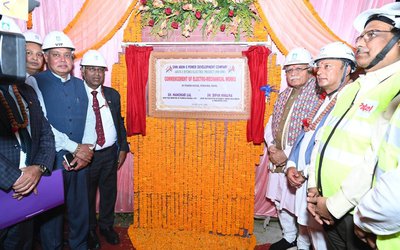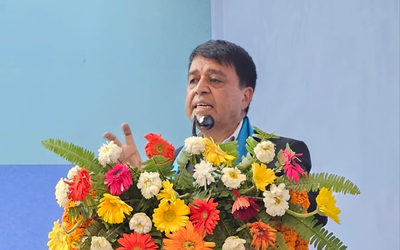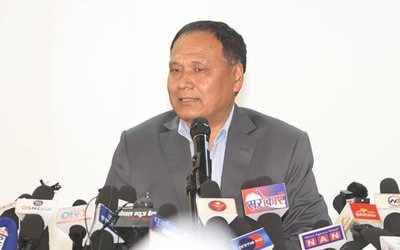Nepal does not shy away from taking initiatives. This is evident in Nepal’s commitment to most of the sustainable development goals. The country has recently committed to another one of these goals – the Zero Hunger Challenge Initiative. Nepal has prepared the National Action Plan of 2016-2025 in line with the Zero Hunger Challenge Initiative. The action plan was jointly launched by Prime Minister KP Sharma Oli and Jose Granziano da Silva, director general of Food and Agriculture Organization (FAO). The country, by incorporating the challenge in into the national action plan, seeks to eradicate the hunger that is highly prevalent in the country.
This initiative taken by Nepal has been highly praised and acknowledged. As the challenge has been set in the national priority agenda, General Silva has showed appreciation towards Nepal’s ‘high-level political will’ and ‘commitment in eradication of poverty.’ Political leaders have also commented on ways to overcome the challenge and the steps that Nepal is already taking towards overcoming it. Prime Minister KP Sharma Oli comments on the necessity of the country to move towards economic reform. The Vice Chairperson of the National Planning Commission commented on the ‘adequate focus required on the physical infrastructure.’ The Minister for Agricultural Development, Haribol Prasad Gajurel, brings our attention to the fact the ministry has already started working towards eradicating hunger. It has approved the ‘Agricultural Development Strategy’, which aims to promote ‘self-reliance in agriculture production.’
I must admit, I tried to stray from using copious amounts of quotes in the paragraph above. I was not successful in my attempt. It is hard not to highlight the grandiosity that is inherent in these statements. These statements or initiatives are not being dismissed, either by me or by the country. They are in fact appreciated to a large extent. However, my question is – what are the parts that make up the whole? In other words, what is ‘economic reform’ and ‘agricultural development strategy’ and what are the steps taken to achieve the reform or implement the strategy? Policy makers cannot envision economic reform by taking a historical perspective – reform cannot be envisioned by taking two or more big events and connecting them. Economic reform is to be envisioned in the same way as it can be achieved – it is to be envisioned as significant positive changes, big or small, that take place in people’s lives, communities, and societies at large.
Amidst the talk about grand plans for the ‘economy’, ‘agriculture’, and ‘physical infrastructure’, one cannot help but wonder – what is the country’s grand plans for its people, especially those sects of people, who, if properly mobilized, have the capacity to eradicate hunger? The United Nations emphasize that in order to achieve zero hunger, adequate attention needs to be given to the empowerment of women. Women play essential roles in achieving zero hunger as “mothers, producers, farmers, managers of productive resources, entrepreneurs, and income earners.” Our political leaders have undertaken the Zero Hunger Challenge Initiative; however, what has been done to nurture the different roles that women can play in the process of eradicating hunger?
The government of Nepal has planned to formulate a gender responsive budget. Again, the phrase ‘gender responsive’ is quite vague and can mean a lot of different things. The nation, as it undertakes the activity of drafting a gender responsive budget, should clearly understand what the term implies and what concrete activities steps can be taken towards drafting such a budget.
There are a few key aspects that have to be taken into consideration while drafting such a budget. First, provisions have to be made for women to be able to own assets that can be used for productive purposes. A large majority of women do not own assets and some have de facto ownership rather than de jure entitlement over an asset. Even if an asset is acquired under a woman’s name, the asset is considered that of the family and the women are excluded from having any independent control over them. This hinders women from owning any productive independent enterprises. Second, the government should make provisions to mobilize micro-enterprises. Micro-enterprises, in the form of self-help groups, have started becoming popular, especially in rural Nepal. These self-help groups largely consist of women and have given women the opportunity to take loans and save. Some women have also utilized the opportunity to invest in entrepreneurial activities.
These are some examples of concrete steps that can be taken to realize the above mentioned goal – to overcome the hunger challenge that currently faces the nation. Even these may seem grandiose to some, and I admit more concrete objectives and targets can be set. What is important for the country is to not shy away from targeting smaller goals while aiming for big ones, which too is equally important.
- Poor (country) on a pile of money
- Dec 16, 2016
- Careful Financial Regrouping Cutbacks Imminent
- Nov 18, 2016
- Women Securing Water
- Oct 01, 2016
- Faithful or Fearful Fluctuations
- Aug 31, 2016
- Walking on Prachanda path?
- Aug 11, 2016
















